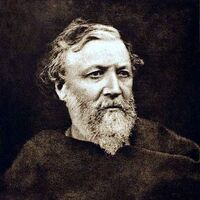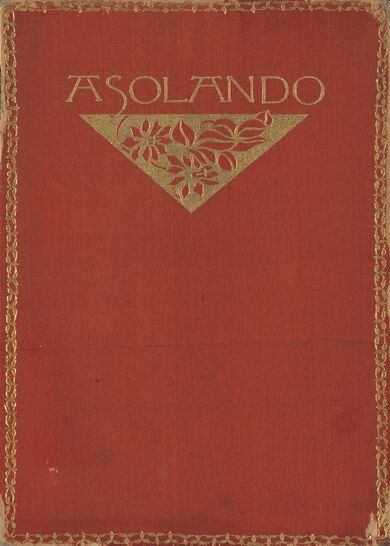The Bean-Feast
He was the man—Pope Sixtus, that Fifth, that swineherd’s son:
He knew the right thing, did it, and thanked God when ’t was done:
But of all he had to thank for, my fancy somehow leans
To thinking, what most moved him was a certain meal on beans.
For one day, as his wont was, in just enough disguise
As he went exploring wickedness,—to see with his own eyes
If law had due observance in the city’s entrail dark
As well as where, i’ the open, crime stood an obvious mark,—
He chanced, in a blind alley, on a tumble-down once house
Now hovel, vilest structure in Rome the ruinous:
And, as his tact impelled him, Sixtus adventured bold,
To learn how lowliest subjects bore hunger, toil, and cold.
There sat they at high-supper—man and wife, lad and lass,
Poor as you please, but cleanly all and carefree: pain that was
—Forgotten, pain as sure to be let bide aloof its time,—
Mightily munched the brave ones—what mattered gloom or grime?
Said Sixtus, “Feast, my children! who works hard needs eat well.
I’m just a supervisor, would hear what you can tell.
Do any wrongs want righting? The Father tries his best,
But, since he’s only mortal, sends such as I to test
The truth of all that’s told him—how folk like you may fare:
Come!—only don’t stop eating—when mouth has words to spare—
“You”—smiled he—“play the spokesman, bell-wether of the flock!
Are times good, masters gentle? Your grievances unlock!
How of your work and wages?—pleasures, if such may be—
Pains, as such are for certain.” Thus smiling questioned he.
But somehow, spite of smiling, awe stole upon the group—
An inexpressible surmise: why should a priest thus stoop—
Pry into what concerned folk? Each visage fell. Aware,
Cries Sixtus interposing: “Nay, children, have no care!
“Fear nothing! Who employs me requires the plain truth. Pelf
Beguiles who should inform me: so, I inform myself.
See!” And he drew his hood back, let the close vesture ope,
Showed face, and where on tippet the cross lay: ’t was the Pope.
Imagine the joyful wonder! “How shall the like of us—
Poor souls—requite such blessing of our rude bean-feast?” “Thus—
Thus amply!” laughed Pope Sixtus. “I early rise, sleep late:
Who works may eat: they tempt me, your beans there: spare a plate!”
Down sat he on the door-step: ’twas they this time said grace:
He ate up the last mouthful, wiped lips, and then, with face
Turned, heavenward, broke forth thankful: “Not now, that earth obeys
Thy word in mine, that through me the peoples know Thy ways—
“But that Thy care extendeth to Nature’s homely wants,
And, while man’s mind is strengthened, Thy goodness nowise scants
Man’s body of its cumlort,—that I whom kings and queens
Crouch to, pick crumbs from off my table, reiish beans!
The thunders I but seem to launch, there plain Thy hand all see:
That I have appetite, digest, and thrive—that boon’s for me.”


